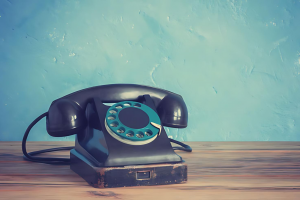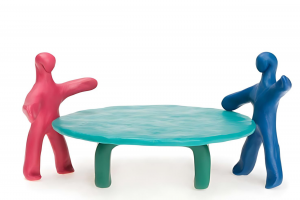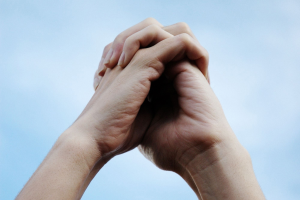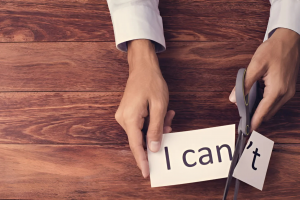Today my Higher Power is the program Principles. When I live by them, I live a spiritual life.
I am writing to share my experience as an atheist in OA. I feel disappointed by the lack of articles written by atheists, particularly articles that don’t end with the author finding faith in God. Even the Big Book’s chapter “To the Agnostic” (Alcoholics Anonymous, 4th. ed., pp. 44–57) encourages nonbelievers to try believing in God. I assert that it’s possible to be spiritual and live a life of recovery without believing in a supernatural God.
I didn’t start out as an atheist. I grew up in a religious family, went to religious schools, married in a church, baptized our children and attended church every Sunday. When I came to OA, I was devoutly religious and embraced my God as my Higher Power.
I immersed myself in recovery from the beginning, went to meetings, got a sponsor, wrote on the Steps, made phone calls and did service. I have over three years of back-to-back abstinence and have always loved OA. It taught me how to live and to bring my religious teachings into my real life.
I’m not sure what started my questioning, but in the last year I began to look at my faith and beliefs with a more critical eye, asking what I believed and what I have been told to believe. I read books, talked with a lot of people and opened my mind to different ideas.
The end result (for now) is that I don’t believe in God as I understood God to be—one who created the world, knows the future and leads us along the path he created for us. I don’t believe God listens to my prayers, talks through other people, finds me parking spaces or keeps me abstinent.
Does this mean I don’t rely on a Higher Power? Of course not. Relying on a Higher Power is essential to my recovery. I’ve just redefined that Higher Power. I found the OA pamphlet What If I Don’t Believe in God? and the books Lifeline Sampler and Seeking the Spiritual Path helpful.
Today my Higher Power is the program Principles. When I live by them, I live a spiritual life. Instead of turning my will over to God, I turn it over to the greater good of mankind. I don’t ask God to remove my defects, but I trust that working the program will remove them. I don’t pray to God, but I meditate on releasing my defects and embracing my assets. I haven’t changed the way I work my program, just how I think of it. When I hear the word God, I think “good orderly direction,” love, or good.
The wording of the Steps and much of our literature supports belief in a personal God, as does the use of the Lord’s Prayer in some of our meetings. I am grateful these did not push me away from the program, but I wonder if religious language turned off others. In some meetings I have heard disparaging remarks about atheists.
I am not criticizing; I know the program isn’t perfect, and I plan to be an OA member for life. I encourage members to keep the door open for everyone, regardless of their beliefs or disbeliefs, and to consider how our meetings appear to those without faith. I hope to encourage others to share their experience, strength and hope. I am an example of someone who works a strong program, has been relieved of the compulsion to over- and under-eat, lives a spiritual life and is an atheist. I am sure there are many like me.
I am grateful to all who have been part of my recovery. Thank you.
—M.O., Huntingdon Valley, Pennsylvania USA





